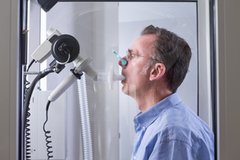2020-03-19
The COSYCONET study is entering the next stage

Approximately 10% of all Germans above the age of 40 years suffer from chronic obstructive pulmonary disease. For this reason, the illness abbreviated “COPD” is one of the eight research areas examined in the DZL. Since 2016, the COPD cohort study COSYCONET has been part of the DZL. A large number of results published by COSYCONET scientists increased our knowledge on COPD. Now, COSYCONET is entering the next stage, in which patients with early COPD are in focus.
The cohort study COSYCONET (“German COPD and Systematic Consequences COmorbidities NETwork”) investigates how lung health, concomitant diseases and systemic inflammation in patients with chronic obstructive pulmonary disease (COPD) are related. Between 2010 and 2013, nearly 3,000 people with varying degrees of COPD participated in the survey. They completed an extensive research program at one of the 31 participating study centers. This included questionnaires on medical history, demographic factors and quality of life as well as a series of lung function measurements. In addition, the study teams examined physical fitness and cardiovascular system functions of the patients. The participants in the study donated blood and urine for later lab analysis. However, COSYCONET was not completed at this point for the patients. In order to study the long-term course of COPD, they have since been visiting their respective study center for follow-up examinations on a regular basis.
The logistics of COSYCONET is a masterpiece that begins with the planning of the visits. When the patients come to the study center, study assistants collect data, perform examinations and process the samples, which are then stored in a central biobank. After completion of the data check, evaluation and analysis are going on. This already led to a double-digit number of publications in scientific journals.
Building up on these previous results, COSYCONET is now entering the next stage, in which the participating study centers recruit 600 patients with early stage COPD. COSYCONET-2 aims at improving our understanding of the onset of the disease and its different courses. Scientists want to find out, if people with lower lung function levels in childhood and adolescence are prone to developing a COPD later in life. Another focus is the understanding of inflammatory mechanisms. All this is important for timely diagnosis and for early treatment.
COSYCONET initially received direct funding from the Federal Ministry of Education and Research (BMBF) and has been an associate member of the DZL since 2016.
This text is an updated version of an earlier news piece.
/jbul
Calendar
Upcoming events
2024-04-24
74th Meeting of ARCN
2024-04-30
Virtual DZL AID Kick-off Seminar
2024-05-29
